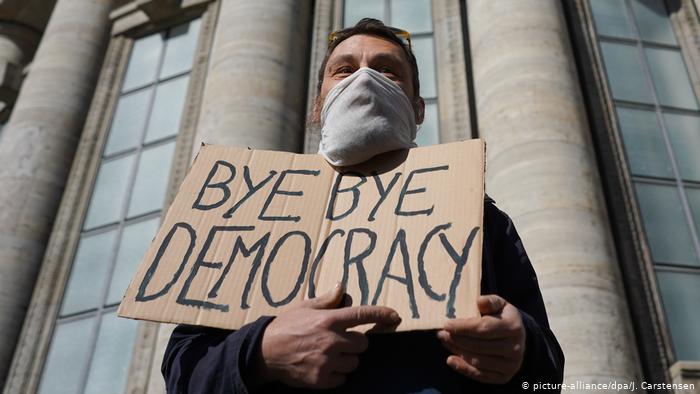Highlight
- The Worry of Governance
- Prying thermometers
- Haven no more?
- Vigilance required
- Researching in the COVID age
- Adapt or die?
- TAI Spotlight: Twenty years with anti-corruption
The Worry of Governance

Photo credit: picture-alliance/dpa/J. Carstensen
As the world adjusts to a new normal, Graham Teskey walks us through the implications of COVID-19 on governance and civil liberty – laying out concerns for state-societal relations and the “worry of governance.” Picking up one important aspect, Rachel Coldicutt explores how the massive digital shift caused by lockdown life is changing civil society now, and what it might mean for the future. While in the absence of “physical” civic engagement and protest, Micah L. Sifry suggests we “invest in building a real digital public square in which everyone, not just those who are better off, can participate on equal footing and with basic privacy protections.”
With media freedom under trial around the globe, including in Kyrgyzstan, Russia, India, Tanzania, and some European countries, watch this panel on the need to protect truthtelling. As we struggle with a COVID-19 infodemic, Edda Humprecht argues that any policy responses to increase resilience to online mis and disinformation must take into account the structural differences of a country’s media environment. Meanwhile, a group of researchers and NGOs expressed interest in studying how online information affects public health.
Human Rights Watch has issued a comprehensive guide for governments and social actors to ensure rights-respecting responses to the COVID-19 crisis now and inform policy choices in the future. Rights and Security International have pulled together a toolkit for civil society partners in fighting for human rights amid the emergency responses ongoing. Oh, and don’t miss Tom Wein’s review of some of the evidence for effective online campaigning and organizing.
Prying thermometers
The debate rages on about digital contract tracing to stop the spread of COVID-19 and the threats to personal privacy. Nine universities and research institutes across four continents have formed a Global AI Ethics Consortium to address ethical questions regarding the use of artificial intelligence against the coronavirus pandemic. Leading scientists and researchers from 27 countries have also called for an open, transparent, and private-by-design contact tracing app systems to stop COVID-19. Ania Calderon discusses how the crisis has pinpointed the need for consensus on collective data rights.
Nicol Turner Lee and Jordan Roberts argue that while public health surveillance will be critical to reducing outbreaks of COVID-19, it must be done in a way that ensures security, protects privacy, and guarantees equity. Privacy International weighs in on the debate, arguing that the call for digital tracing apps to respect privacy in all circumstances is “not about functionality, but about trust”. However, former Vodafone chief executive, Vittorio Colao, thinks the use of “pseudo-anonymized” data could be a potential (recalling previous Weekly coverage of the potential of synthetic data). His argument? Writing from a U.K. perspective he notes that “We trust Uber to know everywhere we go, we trust Gmail with everything we write. If we don’t trust the NHS (Britain’s National Health Service) with our health data then who do we trust?”
Yet, trust is a two-way street. Steve Davenport, Jana Kunicova and Emily Kallauri urge governments to boost their capabilities to track and respond to crises while incentivizing collective action and cooperation because governments that have been relatively successful in containing the virus have gained citizens’ trust by providing clear, accurate, and real-time information.
This is interesting timing for tech giant Microsoft to embrace the “open data movement”. The firm has committed to support twenty data Collaboratives in the next two years and already working with TAI member grantees NYU GOV/LAB and the Open Data Institute. (Need a reminder of the benefits of open data? Check out GOV/LAB’s compilation.)
Haven no more?

Image credit: Ian Berry/CNN Money
Who says good ideas can’t travel fast? Glad to see France follow Denmark and Poland (see last week’s Weekly) in banning firms registered or controlling subsidiaries in tax havens from receiving government bailouts. “If your head office is located in a tax haven, it is obvious that you cannot benefit from public support,” says French Finance Minister Bruno Le Maire, echoing Paul Monaghan’s call several weeks back for a Fair Tax lockdown. Who’s next?
Still on the economics of COVID-19, ICTD’s Research Fellows, Max Gallien and Vanessa van den Boogaard, hosted a virtual roundtable on Covid-19 and the informal economy. They also examined the nuances, challenges, and implications for equity and accountability of efforts to bring the informal economy into the tax net – a move that is increasingly presented as a policy option to raise government revenue in the Global South. Beyond formalizing the economy, Wilson Prichard thinks African governments have stronger incentives than those in the OECD to prioritize taxation of the rich to help respond to COVID-19 and protect the most vulnerable. He gave four reasons why African tax responses to Covid-19 should de-emphasise tax relief, and place greater priority on raising revenue from rich individuals.
Talking of the very rich, it seems some billionaires are doing very nicely even amid a looming depression. Chuck Collins, Omar Ocampo and Sophia Paslaski dig into the “pandemic profiteers” in the United States. Anyone doing similar analysis for other country business elites?
As efforts continue to relieve low and even middle-income countries of debt service payments, the problem of hidden debt is creating problems. Populations have a right to know what debt is being taken on by the public purse, yet secret deals continue. Hungary just signed an agreement with China to build a rail link from Budapest to Belgrade, but good luck trying to find the terms of the deal. The government has drafted legislation classifying that information for ten years.
In more encouraging news, intriguing to see Chinese insurance giant Ping An Insurance Group become the first Asian institutional investor to partner with the Climate Bonds Initiative. This follows their becoming a recent signatory to the United Nations Principles for Responsible Investment and being the first Chinese insurer to adopt a coal phase-out plan.
Vigilance required

Image credit: Phil Hands
In the scramble to secure medical supplies for nervous populations, transparency becomes a casualty in the fight against COVID-19 as principles of good governance are falling by the wayside. In Europe, dodgy purchases are already multiplying amid opportunities for fraud and corruption. In South America, anti-corruption took a devastating blow in Brazil with the sudden resignation of Justice Minister who championed anti-corruption efforts from Car Wash scandal. Turning to Southern Africa, members of the Partnership for Social Accountability wants governments to ensure Covid-19 responses are accountable, protect human rights, and strengthen public services and social protections. Going west, intriguing to see Liberian legislators welcome their president’s ambitious state of emergency plan with a call for transparency and accountability.
Accountability Lab’s Founder, Blair Glencorse takes a sweeping global look at how widespread graft within governments hinders relief efforts and how policymakers can enact change and promote accountability. Stephen Golub recommends the use of legal empowerment to curb corruption and advance accountability and service delivery across a range of fields.
On the increase in cyber-attacks threatening the global financial system, Tim Maurer and Arthur Nelson advocates for an international coalition to prevent nefarious actors from exacerbating the crisis.
Researching in the COVID age

Photo Source: Transparency International Health
Innovation for Poverty Action just launched a COVID-responsive research agenda with the virtual infrastructure to host a resource hub of data tools, evaluations, and datasets around the immediate health crisis and the protracted economic crisis. These data will be given to local governments in low-income countries to create public health recommendations and policies.
OnThinkTanks share lessons from moving their annual conference online, with just weeks to go. What they did? They acted fast, embraced transparency, relied on their social and professional community support, and made social media their ally. They also shared lessons on their COVID-19 response plan which is based on their four core pillars of work: generating knowledge, learning, convening, and sharing content and resources.
Adapt or die?
Global funding support to prevent, combat, and recover from the impacts of COVID-19 continues to grow. An analysis of Devex funding data between Jan. 1 and April 19 reveals over $15.3 trillion has been pledged by governments, bilateral donors, multilateral institutions, philanthropic donors, NGOs, and the private sector in the fight against COVID-19. Check out the interactive COVID-19 funding map to explore where the funding is going, who’s supplying the money, and what funding is focusing on (the data is continually updated). On Think Tanks has also compiled a list of philanthropies’ early international responses to COVID-19.

Image credit: Oberlo
Adrienne Day reminds us again this week why grantees need to forge meaningful connections with donors as they cope with rapid changes during this unprecedented time. (More reasons in last two Weeklys). According to her, “Nonprofits that fail to create and sustain a relationship with the people who believe in them may lose their support and fail in their mission.” In a complementary vein, President and CEO of American Jewish World Service, Robert Bank, urge funders to seize the moment to support human rights for the stigmatized and underserved groups. Don’t miss these resources from S.D. Bechtel, Jr. Foundation on organization resilience, especially how nonprofits can adapt in times of crisis and how foundation partners can help.
Watch last week’s masterclass from Reboot on driving transformation change (something so many of us aspire too, but can do with all the tips we can get). Pair with this practical decision-making guide for donors and social institutions grappling with COVID-19 response and INASP’s digital learning specialists’ tips for sharing learning and moving forward
Atta Tarki shares lessons from his experience as a board member, highlighting how too many nonprofits aren’t comfortable with making and learning from mistakes but would be far better off if they when they do.
On a final note, Miles Wilson urges philanthropy to stop being fixated on a logic model of evaluation with inputs, activities, outputs and outcomes. For challenging systemic work, such as pursuing social justice, he cautions “the sector must recognize that a one-size-fits-all approach to evaluation doesn’t benefit foundations, nonprofits, or the constituents nonprofits seek to serve.”
TAI Spotlight: Twenty years with anti-corruption
Twenty years with anti-corruption | DFID
In the first of a ten-part series, DFID veteran, Phil Mason explores the origins of DFID’s contribution to anti-corruption and lessons learned over the past two decades. He highlighted some of the innovations that have proved valuable, and point up some of the challenges that remain for his successors.
A long-term commitment to democracy | Hewlett Foundation
Hewlett Foundation is strengthening its investments in America’s democratic institutions with a $22 million a year investment. The new U.S. Democracy Program builds on the work of the Madison Initiative, a time-limited special project. “At such a critical moment for democracy, in the United States and around the world, pulling back and doing nothing is a bigger risk, “says Larry Kramer and Daniel Stid.
Challenging misinformation in Nigeria | Luminate
Luminate announced investment in Stears Business, a Nigeria-based digital media & information company that provides Nigerians with high-quality news and analysis to make informed business, economic, and political decisions, and to actively participate in public life.
Using context to break ‘systemic corruption’ | MacArthur Foundation
Find out how MacArthur Grantee, Office for the Protection of Children’s Rights—Oficina de Defensoria de los Derechos de la Infancia (ODDI), is bringing justice to victims and families who have been the victims of human rights abuses in Mexico. MacArthur has provided over $1.7million of support to the organization since 2007.
OSF’s emergency response to COVID-19 | Open Society Foundations
The Open Society Foundations announced an investment of $130 million to combat the devastation in the wake of coronavirus—focusing on communities too often left out and left-back by government policy. The fund will provide immediate relief for vulnerable communities, push back against government encroachment on political freedoms across the world, and support urgent climate crisis priorities related to the COVID-19 pandemic
Calls and job listings
Job postings at Ford Foundation – Ongoing
Job postings at Luminate – Ongoing
BetterTogether Challenge for innovators – Ongoing
Job postings at Democracy fund – Ongoing
Free Digital Security Training – Ongoing
Open Road Alliance Charitable Grant and Loan to organizations responding directly to COVID-19 – Ongoing
Pulitzer Center Coronavirus news collaboration challenge – (Applications will be reviewed on a first-come, rolling basis)
Call for research proposals: Tax and development in South Asia – Proposal accepted on a rolling basis
Call for proposals: Informality, tax, and the state – Proposals accepted on a rolling basis
PWYP strategic communications & campaigns manager – April 24, 2020 (Location: London, UK or Brussels, Belgium)
The Boston Globe Spotlight Investigative Journalism Fellowship – April 24, 2020
Research Officer for quantitative work on Rwanda and Ethiopia at ICTD – April 25, 2020
Call for Applications: Making a Difference Awards (highlights and promotes how the best of research has made a significant difference to Charities and Not-For-Profits) – April 27, 2020
Getty Images inclusion scholarship – April 27, 2020
Co-Impact systems change grants (round three) – April 30, 2020
Request for proposal: Independent public interest journalism – April 30, 2020
Call for suggestions on humanitarian and development data forum agenda – May 2020
Senior/Principal Research Fellow in the Politics and Governance team at Overseas Development Institute (ODI) – May 1, 2020
Director Listening and Learning at Global Integrity – May 1, 2020
Allard Prize photography competition – May 1, 2020
Grants fund investigative journalism – May 4, 2020
Creatives needed for exciting animation project – May 10, 2020
Call for Projects Paris Peace Forum 2020 – May 12, 2020
Research opportunity – Enabling and inspiring duty-bearers to act with integrity – May 17, 2020
Research opportunity – Achieving positive solutions to citizen-identified problems with service delivery – May 17, 2020
Media integrity contest for South Africans – May 19, 2020
Summer school for journalists open for Russian citizens – May 20, 2020
Call for applications: Intensive anti-corruption training for future leaders – May 20, 2020
Lead Researcher at ICTD DIGITAX programme – May 24, 2020
Policy and engagement consultant at ICTD DIGITAX programme – May 24, 2020
Proposal submission for the 2020 Summer Evaluation Institute – June 7-10, 2020
Marielle Franco Award for feminist essays 2020 – June 16, 2020
Open call for grants funding on social accountability and transparency in the national education sector – June 19, 2020
IBM call for Code Covid-19 Global Challenge – July 31, 2020
Amartya Sen essay contest 2020: Illicit financial flows – August 31, 2020
Call for submissions to SSIR Series: Social change in an era of extreme polarization – Last Thursday of every month until early 2021
Calendar
Please double-check the websites for these events to make sure they are still happening – many are subject to change due to the spread of coronavirus.
Transparency International: 19th International Anti-Corruption Conference – (Postponed)
Global Technology Governance Summit – April 21-22, 2020 (San Francisco, United States of America)
Shaping the Future Forum 2020 – April 22 – 23, 2020 (Washington, DC)
Webinar: How to deal with COVID-19 and data – 22 April 2020, 9 AM EDT
Open Contracting Community Call: U.S. municipal procurement in the era of COVID-19 – April 23, 1 PM ET
Webinar: Listening and learning from nonprofit partners during disasters – (23 April 2020, 2PM EDT)
Virtual Office Hour – Managing change in (rapidly) changing times (Every Thursday at 2pm ET through April 23)
British Expertise International Awards 2020 – April 23, 2020 (Kensington, United Kingdom)
3ie London Evidence Week Conference 2020 – April 23, 2020 (London, UK)
Personal Democracy Forum CEE 2020 – April 23-25, 2020 (Gdansk, Poland)
2020 International Symposium on Online Journalism (ISOJ) – April 24-25, 2020 (Austin, United States of America)
Webinar: Big Data, AI and Pandemics – April 28, 2020 (12PM-1PM EST)
FACTI Panel virtual global townhall with civil society organizations – April 28, 2020 (14:00 – 16:00 UTC)
Open Budget Survey (OBS) from International Budget Partnership – April 30, at 9 a.m. EDT (UTC-4)
Advancing the frontiers of transparency and accountability in the extractives sector – April 30, 2020 5:00 PM-6:30 PM UK
Dart Center webinar series on COVID-19 reporting (Running till 30 April)
2020 Collective Impact Virtual Convening – May 6 – 8 2020 (12:00 CDT)
Global Digital Development Forum May 6, 2020 6AM-10P GMT
Webinar: Time for a Selfie: Evaluation Capacity building for Funders – May 6, 2020 (1:00 – 2:00 PM EST)
Frontiers of Social Innovation: People, Power & Resources: The Redistribution Wave – May 12-14, 2020 (Stanford University, California, USA)
Fundraising in a crisis: focus on donors most likely to give —May 14, 2020
Donor advised funds and their critics: Do DAFs help or hurt philanthropy? – May 14, 2020 (11:30AM – 1:00PM PDT)
2020 Data Foundation virtual symposium – May 20, 2020 (10:00 AM – 2:30 PM EDT)
2020 Media Impact Forum (funder-only gathering) – June 2, 2020 (New York, United States of America)
Human Rights Litigation Summer School at Berlin, Germany – June 8-12, 2020
Women and Girls Africa Summit – June 9-12, 2020 (Durban, South Africa)
RightsCon 2020 – June 9-12, 2020 (San Jose, Costa Rica)
2020 Neighborhood Funders Group National Convening (philanthropy support to grassroots power-building) – June 29 – July 1, 2020 (Washington, DC)
WE EMpower UN SDG Challenge 2020 – September 18 – 27, 2020 (New York City, United States of America)
The 2020 Journalism Funders Gathering (funder-only gathering) – October 6-7, 2020 (Philadelphia, United States of America)
Humanitarian and Development Data Forum – November 2-4, 2020 (Chambery, France)
International Open Data Conference –November 18-20, 2020 (Nairobi, Kenya).


